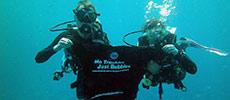Scuba diving is a recreational activity that is becoming more and more popular every year. It can be enjoyed by anyone aged 10 years or older in pools, freshwater and seas all around the world. Some people have all their own gear and tanks, and dive as and when they choose in the sea or a local lake, but most people pay to dive with a diving centre from the beach or off of a boat. Costs vary greatly around the world, but in general scuba diving is not a cheap activity. The cost of scuba diving includes several factors, which include the equipment, getting to the location, staff, and maybe local fees for entering a lake or national marine park.
Scuba diving equipment is not cheap to buy, and a complete set of good-quality diving gear usually costs $1,500 or more. In addition, it needs regular maintenance. Divers who don’t have their own gear can rent it from a dive centre, usually at a fee of $20+/day. Getting to the dive site usually involves a boat ride, and running boats is expensive for several reasons, which include mooring fees, fuel and more. Public lakes and national marine parks are usually protected by local authorities who may charge a fee for members of the public to enter and/or dive.
Our diving guests often ask if they can pay a lower rate if they miss or skip a dive. They may be flying the same day or the following morning, or maybe just don’t want to dive as much as others on the boat. Also, sometimes the boat or dive centre need to reduce the number of dives on a trip due to factors out of their control, such as sea or weather conditions. It’s important to understand that the cost of ‘each dive’ is a very small percentage of the overall cost of a scuba diving trip, and missing one or two dives usually makes no difference to the price paid by the customer.
Why Can’t I Get a Discount or Partial Refund If I Miss Some Dives?
The cost of scuba diving liveaboard & day trips involves many things, and filling a tank of air is a tiny percentage of the overall cost. Depending on the type of boat, length of trip, and dive staff & boat crew, the main costs are the running of the boat (especially fuel) the salaries of the staff & crew, and food for everyone on board. If one or two guests decide to skip a dive, then the cost to the dive centre or boat owner is the same. The Divemaster guide still needs to be paid, and will most likely lead other divers anyway. The cost of fuel, food and salaries doesn’t change. Therefore, when our guests ask for a lower price because they plan to or already missed one or more dives, it’s necessary to explain that a discount or partial refund is not possible. Filling the tank of air is the only financial difference to the dive centre or boat owner, and this costs nothing or almost nothing due to the compressor running off of the boat’s generator.
What Happens If the Dive Centre or Boat Reduces the Number of Dives of a Trip?
Occasionally, extreme or unseasonal sea or weather conditions mean that not all of the planned dives are possible. This may also happen in the case of mechanical failure or some other external factor. Again, the cost of the trip is still the same to the operator as if all the planned dives are provided. They would never cancel dives just to save a very small amount of money on filling tanks. If the dive centre or boat operator are forced to cancel one or more dives of the trip, they usually explain clearly to everyone on board, and in most cases they will offer some kind of compensation, such as free beer or merchandise. This is always their decision and nothing to do with the booking agent or staff on board. It’s always up to the captain and cruise leader, taking into account the safety of all on board as a priority.
What are the Expensive Costs of Scuba Diving?
- The boat is by far the greatest cost. Boats are extremely expensive to buy & run. Boats are very expensive, and even if they aren’t used it costs a lot of money to keep them. If the boat is used, then of course the fuel is a huge expense, but so is regular maintenance of the engine & other parts.
- The food on a diving trip is also expensive. It must be bought and prepared in advance, and kept fresh for the whole trip. Also, it’s important that guests have enough, which means that more than enough food is always bought and prepared. Keeping ingredients cold and gas for cooking also costs money.
- Diving equipment is expensive to buy, and it needs regular maintenance. After two or more years of regular daily use, it usually needs to be replaced. In addition, each boat or dive centre needs more than enough sets of dive gear to be sure to have enough of every size. For example, if a group of large or small people all want to dive at the same time, then they all need gear to fit them. It’s important for scuba diving equipment to fit properly.
- The boat crew and dive staff all need to be paid. Often the local crew’s salaries are less than the dive staff, but they may get paid during the low season as well. Employing cheaper staff is dangerous both for business and for the overall wellbeing & safety of everyone on board. It’s vital to have qualified and experienced staff & crew on every trip.


